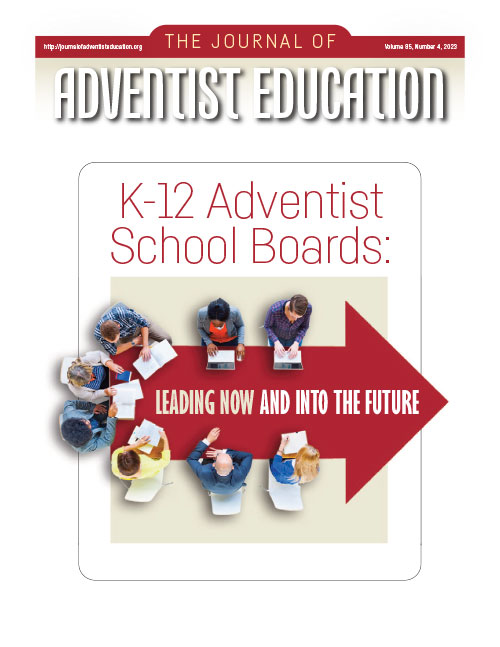Open Calls
The Journal of Adventist Education® publishes articles of general interest to teachers and intermittently will publish articles on a specific theme. You may submit manuscripts on any topic that will appeal to Journal readers at any time; however, articles for theme issues or special sections must be submitted by the submission deadline. Regular manuscript guidelines regarding length and style apply, and manuscripts must be submitted to Editorial Manager: http://www.editorialmanager.com/jae/default.aspx.
OpenAI, Chatbots, Deep Fakes, Oh My! Responsible Use of Generative AI in Adventist Education
Deadline: June 28, 2024
The world of generative AI is moving at warp speed--outpacing educational policies and practices. According to Kornblut and Barnhart, as educators and members of the public, we must “come to grips with the tectonic forces of artificial intelligence, containing its risks and harnessing its power for good.”*
To this end, we seek articles that explore the ethical, responsible use of generative AI in Adventist schools and classrooms, Kindergarten through higher education. Manuscripts about policy-making for schools, effective use in the classroom, successful implementation, curricular adaptations, accessibility, ethical responsibilities, resource sharing, generative AI and the integration of faith with learning, and global impacts on educational practice will be considered for publication.
*Sally Kornblut and Cynthia Barnhart, Massachusettes Institute of Technology
Adventist Education in the Post-Pandemic Age
Deadline: June 28, 2024
On May 5, 2023, the World Health Organization declared an end to the global health emergency caused by COVID-19. Much about how we live and learn changed during the pandemic. Worldwide, the professionals who provide educational services to students have had to make decisions that have altered how education is delivered to students in primary and secondary schools, colleges, and universities. Adventist educators and educational administrators have had to do the same. This call is for articles documenting how educators and educational administrators have navigated the necessary transitions for continued success during the post-pandemic era.
Articles should contain practical applications for Adventist education in education theory, practice, and research that could be useful for the international readership of The Journal of Adventist Education. Topics could include the following: Adventist educator responses to pandemic-related challenges in providing distance and online education; leadership strategies and strategic planning for times of crisis and beyond; practical suggestions for maintaining contact and engagement with students and families; recommendations for helping students navigate trauma and practices that could be useful in helping them address not only COVID-19 but other disruptions that are sure the follow; policies and best practices that support and promote effective, efficient teaching and learning.
Classroom Assessment Practices That Work
Section Editors: JAE Editorial Staff
Submission Deadline: Ongoing
In his well-known work Classroom Assessment and Grading That Work, Robert J. Marzano explores the role of formative and summative assessment and grading in helping to increase student engagement and mastery. He posits that an effective assessment plan is "one of the most powerful weapons in the teacher's arsenal" (p. 2). Several other practitioners, from Eric Jensen to Susan Brookhart and so many more, have delved into what works and have sought to provide practical, how-to examples and advice for all levels of academic learning.
This Call for Manuscripts invites submissions on effective classroom assessment practices that work, Kindergarten through higher education. Potential approaches to the topic include addressing common misconceptions about assessment and presenting instructional methods that complement assessment practices and lead students toward understanding; a "how-to" for using state or national standards documents when creating an assessment plan; approaches to increasing student mastery and proficiency; ways of engaging students in the assessment process; or, a description of an assessment plan that has been developed to meet the needs of a specific school environment, inclusive of challenges to implementation and solutions to the challenges. Manuscripts should provide practical advice, information, and "how-to" examples applicable to various classroom environments. Preference will be given to manuscripts that include the following: (1) examples from actual classroom practice (from the teacher's own experience rather than examples or case studies from secondary sources); (2) examples that demonstrate the integration of faith with learning in classroom assessment practices.
Ongoing Feature Sections
Best Practices at Work!
Section Editors: JAE Editorial Staff
Publication Date: Ongoing Feature (upon selection)
What are best practices? How are teachers using them? How effective are best practices in making an impact on learning? The Journal of Adventist Education® has launched a new ongoing feature section dedicated to showcasing best practices at work. The section will feature the experiences of practitioners who have successfully implemented best practices to solve a problem, enhance the learning environment, or stimulate and engage students.
We invite papers describing how teachers and school administrators utilize best practices in the classroom or across school settings to engage learners, strengthen the curriculum, and help learners navigate the discovery process. Each paper should clearly describe the learning environment, the best practice employed, the implementation process, challenges, and successes, evidence (qualitative and quantitative) to support the impact on the learners, school, and community, recommendations for future practice, and a list of helpful resources.
Critical thinking, problem solving, active learning, and collaboration are examples of research-based best practices used to stimulate learners, invigorate classroom instruction, and consistently help learners scaffold information, connect principles and ideas, and make applications.
Perspectives
Section Editors: JAE Editorial Staff
Publication Date: Ongoing Feature (upon selection)
Perspective is a particular attitude, a point of view, or a frame of reference. It can also be a position, stance, or way of seeing things. The Journal of Adventist Education®, the professional journal for Adventist Christian educators, has a perspective—one that is rooted in the seamless integration of faith with teaching and learning. Articles in this feature section critically examine an area of academic content through the lens of faith and provide specific, in-depth recommendations for practice. The emphasis on strengthening faith within the discipline and beyond the classroom is underscored.



